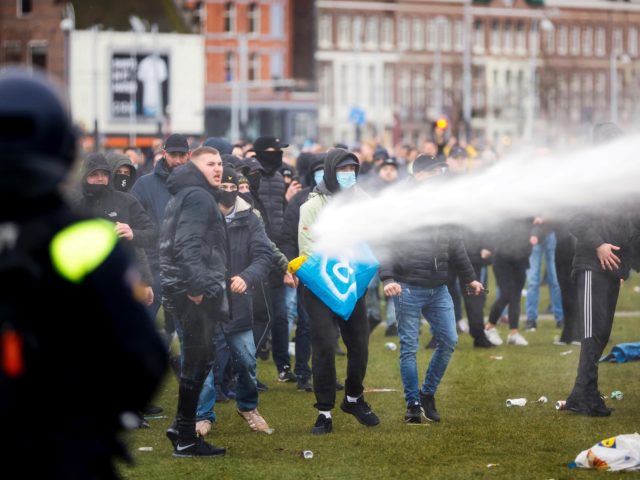Riots erupted in the Netherlands on Sunday as citizens showed defiance against the national 9 pm coronavirus curfew imposed on the country.
Approximately 240 people were arrested in the Netherlands, mostly in Amsterdam, as anti-lockdown demonstrators squared off with riot police, who fought back the crowds with water cannons and tear gas.
During the riots, police were attacked with makeshift missiles, fires were set, and businesses were vandalised.
In the city of Eindhoven, at least 30 people were arrested after demonstrators hurled fireworks and pelted police officers with golf balls, according to Dutch News. The protesters went on to block train services by walking on the tracks and vandalised the station’s shops.
In Amsterdam, some 150 people were arrested after facing off with officers, who used police dogs and water cannons to disperse the crowds.
Outgoing Dutch Prime Minister Mark Rutte condemned the violence, saying: “It is inadmissible. Any normal person can only react to this with horror.”
Rutte said that the riots were “criminal violence” and had “nothing to do with the fight for freedom”.
“You really have to wonder what were these people thinking? The only fight we have to fight is to beat the virus,” he said.
National Security Council Chairman Hubert Bruls added that while he sympathised with the frustration of people, he said: “If we persevere now, we will get our freedoms back sooner.”
The Dutch Police Union (NPB) warned that the unrest on Sunday might only be the beginning of riots in the Netherlands.
“I hope it was a one-off, but I’m afraid it was a harbinger for the coming days and weeks,” NPB spokesman Koen Simmers said.
The police union representative claimed that the violence witnessed was the worst the country has seen in over 40 years since the Squatter riots in Amsterdam in 1980.
The mayor of Eindhoven, John Jorritsma van Eindhoven, gave a more stark warning, saying that “if we carry on like this, we will be heading toward civil war”.
The Netherlands, which has seen 13,000 deaths from the Chinese coronavirus, has forced bars and restaurants to close since October. The government shut schools and other so-called non-essential shops last month.
The coronavirus curfew was set in place on Saturday night, the first curfew in the country since the end of the Second World War.
Follow Kurt Zindulka on Twitter here @KurtZindulka

COMMENTS
Please let us know if you're having issues with commenting.